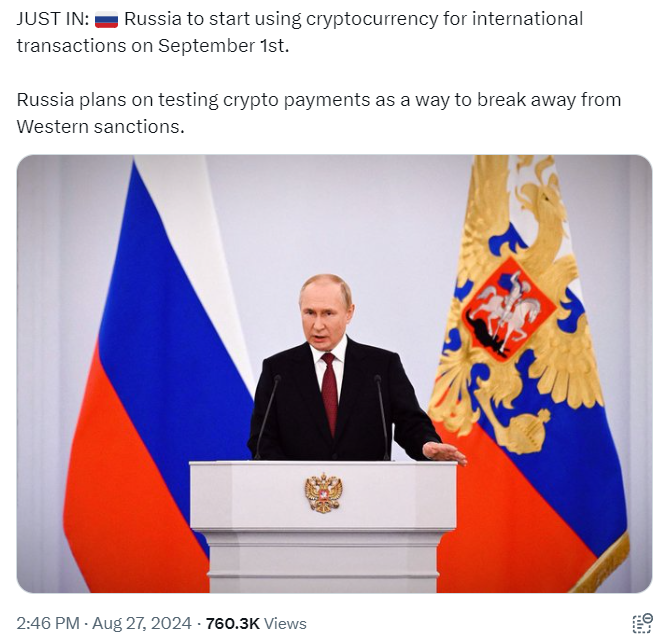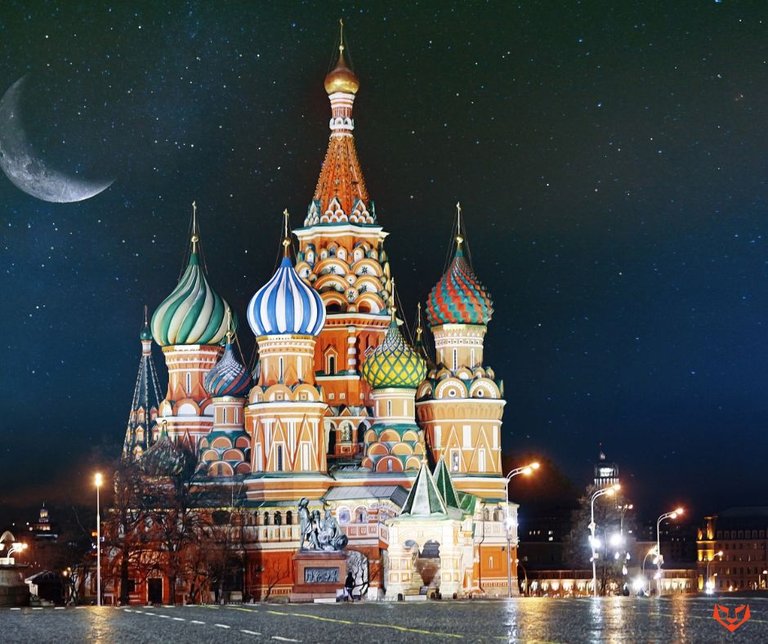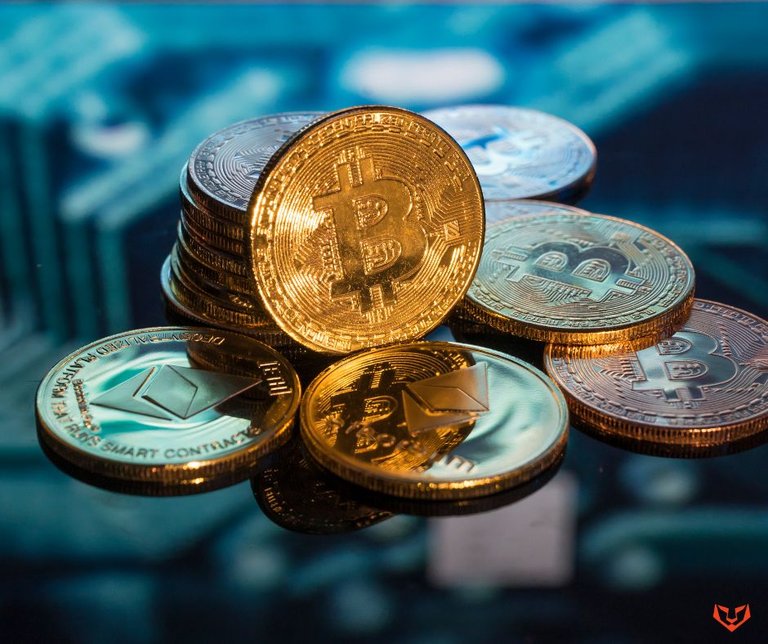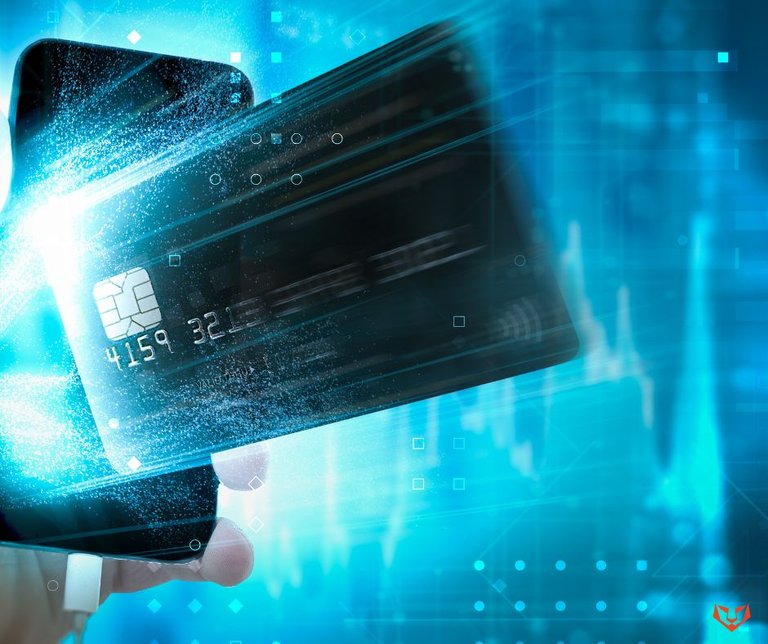
Russia Turns To Cryptocurrency to Bypass Sanctions
In a surprising pivot from its historically anti-crypto stance Russia is preparing to test Bitcoin and other digital assets for cross border transactions as early as September 1, 2024.
This trial, facilitated through the National Payment Card System (NPCS) aims to create an alternative route for international payments potentially circumventing Western sanctions over Moscow's actions in Ukraine. This initiative signals a strategic manoeuvre by Russia to navigate around the restrictions that have crippled its access to the global financial system. How the U.S and other nations address this is yet to be seen.

Sanction Impacts
Since the onset of the war in Ukraine, Russia has faced increasing economic isolation. Western sanctions have targeted various sectors of its economy with recent measures in June 2024 extending to banks friendly to Russia including China These sanctions disrupted traditional financial transactions limiting the flow of money and creating significant hurdles for Russian exporters. For example, major Chinese banks have ceased yuan transactions with Russia despite the yuan's importance in the Russian economy, reflecting fears of secondary sanctions from the United States.
The sanctions also extended to cutting Russia off from the Society for Worldwide Interbank Financial Telecommunication (SWIFT) system, effectively barring Russian financial institutions from participating in the global banking network. As a result Moscow continues to struggle to conduct transactions in US dollars and other Western currencies, forcing it to seek alternatives to maintain its trade relations.

Russia Turns to Cryptocurrency
Historically Russia has maintained a cautious and often antagonistic stance toward crypto currency citing concerns over financial stability and potential misuse for illicit activities. In 2022 there were even calls within Russia to implement a blanket ban on cryptocurrencies. However, the economic challenges posed by international sanctions have prompted a reassessment of this stance.
On August 8, 2024, President Vladimir Putin signed a law allowing the creation of a framework for cross border cryptocurrency transactions. This marked a significant legal shift and a departure from previous policies. The legislation also opened the door for crypto mining within the country and showing a broader acceptance of digital currencies.

Payment Systems
The NPCS established by the Russian central bank in 2014 operate the Mir payment card network and handles interbank payment systems within Russia. Given its existing infrastructure and regulatory framework the NPCS is a logical choice for the crypto trial. According to Bloomberg, the system will facilitate the conversion of Rubles into cryptocurrencies providing a pathway for cross border transactions that bypass traditional banking channels.
By leveraging the NPCS's existing capabilities Russia hopes to establish a secure and regulated environment for these transactions by minimizing the risks associated with unregulated crypto exchanges. The use of a state controlled system also allows for greater oversight and control which aligns with the government's broader regulatory objectives.
Potential Implications for Global Crypto Markets
Russia's move to adopt Bitcoin and other cryptocurrencies for international payments could have a secondary impact on the global crypto market. As it shows growing acceptance of digital currencies as a legitimate alternative to traditional financial systems, particularly in regions facing economic and political instability.
Russia's initiative could pave the way for other countries under sanctions or those seeking alternatives to dollar dominated financial systems to explore similar strategies. This could increase demand for cryptocurrencies potentially driving up their value and enhancing their role in global trade.
Russia's involvement could accelerate the development of international regulatory standards for crypto transactions as other nations move to close the gap on the sanctions. While the decentralized nature of cryptocurrencies has been a key selling point, the involvement of a major world power in state regulated crypto transactions could prompt calls for change.
Challenges and Risks
There are significant challenges and risks associated with Russia's crypto experiment. The volatility of cryptocurrency prices remains a major concern. While Bitcoin and other digital assets have gained popularity their value can fluctuate dramatically. Posing risks for businesses and governments using them for international trade.
The integration of cryptocurrencies into state controlled systems could face resistance from global regulatory bodies and financial institutions. Many countries have strict regulations on crypto transactions to prevent money laundering and other illicit activities. Russia's move might be viewed as such a move potentially leading to further economic and political tensions.
If the trials prove successful Russia may expand its crypto initiatives by allowing traditional financial exchanges like the Moscow Exchange and the St. Petersburg Currency Exchange to develop their own crypto platforms. This could further entrench the use of digital currencies in Russia's economic strategy providing a more stable and regulated environment for crypto transactions.
Russia's decision to test Bitcoin and other cryptocurrencies for cross border payments reflects a strategic shift in response to economic isolation by Western sanctions. By leveraging the existing capabilities of the NPCS, Russia seems set to create an alternative financial pathway that could reduce its reliance on traditional banking systems and Western currencies.
This poses a serious risk to western nations who sanctioned Russia for it’s ongoing action in Ukraine, but the move is yet to be seen to work given the high volatility of Crypto currencies, Russia may end up losing more than it gains and so to their businesses that switch to the system.
Image sources provided supplemented by Canva Pro Subscription. This is not financial advice and readers are advised to undertake their own research or seek professional financial services.
Posted Using InLeo Alpha